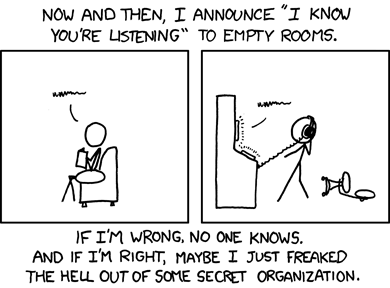I'm pretty sure the Herald-Times of Bloomington, IN, is a sub-par paper with a short-sighted business model.
I say I'm "pretty sure" because the Herald-Times has developed two strategies that prevent me from knowing for certain: a paywall that keeps me from looking into whether the quality and content merit the paywall; and an apparent "no comment" policy with respect to the paywall, circulation numbers, and long-term subscription strategies.
How do they ignore people? Let me count the ways.
I learned about the "no comment" strategy after several weeks of seeking response from the paper. I went about seeking this response in a deliberate way: First, I challenged the paper through Twitter, by posting links to reports and articles about other papers' efforts to make newspapers available for cheap or free to Bloomington college students; by linking to free versions of the walled-off stories posted via the paper's Twitter account; and by stating my case, 140 characters at a time, for the paywall to be dropped. I ended each tweet with this challenge:
what say you, @theheraldtimes?
Nothing.
Next, I published
a blog post about the issue in which I argued that not only was the paywall a short-sighted business model, but also that the paper was misusing Twitter by linking followers to content for which they would be required to pay. I wrote:
[M]y first request to the Herald-Times is this: Be nice or leave. Either stop spamming us, or lock your Twitter account to all but paid subscribers to the paper. Twitter is not the place to hustle subscriptions.
My second request is this: Tear down the goddamned paywall. The Herald-Times is, for all intents and purposes, the only local newsdaily (though I'll offer alternative news sources below). This means it certainly can but absolutely should not erect a paywall for web content. The need to make local news available for free becomes more urgent when you consider the demographics of Bloomington. It's the home of Indiana University, a college town whose median age is 23 (.pdf).
I ended the post with this:
what say you, @theheraldtimes?
Nothing.
I circulated a link to the post on Twitter. "what say you, @theheraldtimes?" I asked each time I linked to it. @theheraldtimes had nothing to say.
So I emailed the managing editor, Andrea Murray, and the publisher, Mayer Maloney, requesting comment. My request was forwarded to another member of the Herald-Times staff, who ultimately informed me that the only person who would serve as the official spokesperson on this issue was Maloney himself. Clearly, then, Maloney's approach to his role as the official spokesperson is silence.
I sent a final request, informing the paper that I wanted to publish a follow-up post exploring approaches to gaining readership in a college town where, presumably, the future readers of newspapers are gaining their sea legs (or not, depending on the approach to gaining readers). You can guess, I bet, what kind of response I received to my request for comment.
Why ignoring angry social media users is a really bad idea
Since my multiple requests for comment have been met with stony silence, I can only guess at the paper's reasoning based on context clues. First, Maloney has made it clear on numerous occasions (presumably in interviews with people he considers "real" journalists) that he sees the paper's paywall as a roaring success (
here, here). I don't see it that way--as I wrote in my previous post on this issue, I see paywalls as a short-term solution to a deeper, longer term problem that's actually worsened by paywalls. It's like dealing with burst plumbing by putting down paper towels to clean up the water.
I suspect, too, that Maloney doesn't see me as a big enough fish to waste his time on. After all, I'm just an obnoxious pup with a strangely titled blog that reaches
maybe a few hundred people a day.
It's true: I
am an obnoxious pup with a strangely titled blog that reaches maybe a few hundred people a day. I am also a member of a key demographic for the future of the Herald-Times: 12-99-year-olds who are comfortable broadcasting their opinions, supporting those opinions with evidence, and circulating those opinions to several hundred to several thousand people. (My blog had just over 2,000 unique visitors in November.) As we know, after all, opinions are made through loose association and vague understanding of issues. All it takes, sometimes, is a handful of angry tweets, maybe a quick skim of a blogpost, for a small group of people to decide how they feel about an issue or product. This is word-of-mouth marketing on steroids; only this time, it's the consumers, not the marketers, who decide what the message will be.
I'll use my experience as an example. Though my tweets and blog post never garnered a response from the Herald-Times, it did generate responses from several
other members of my social networks, all of whom offered some version of this:
the H-T is a terrible paper with pretty shoddy business practices. Here's a list of some alternative news sources.
It shouldn't be news to anybody that with print media in its precarious state, the last thing a newspaper needs is for the above message to circulate across social networks. But this is exactly what's happening with respect to the Herald-Times. It doesn't help that the paper uses its Twitter feed
not to contribute to the larger knowledge-building work of that platform but to direct people to content they have to pay for to access. I've said it before, and I'll say it again:
This is against the very spirit of Twitter. It is unethical, inappropriate and unwanted.
The Herald-Times is building a bad name for itself for many reasons, which would be bad enough if it could counter this reputation by making it clear that the paper offered really solid local news reporting. But here's the thing about erecting a paywall around your content: People have to be given a good reason to pay. I imagine (I can't know for sure, since I'm swimming in this sea of silence) that publisher Maloney takes his subscription numbers and continued ad revenue as proof that people value what his paper has to offer. I counter that his subscription numbers and ad revenues, whatever they are, are only the product of a single key fact: that the Herald-Times is for all intents and purposes the only game in town.

But the game is changing. Yesterday, newspapers could assume they filled an important community function; today, newspapers have to
prove (to readers and advertisers) that they fill an important community function. There is still a sizable chunk of the population who will continue to subscribe to print media outlets, but young people--especially those who have grown up surrounded by free information and take for granted that they shouldn't have to pay for what they can get for free--young people have to be given a reason to subscribe. They have to be shown the value of local reporting, of community newspapers. They have to be shown that their local paper fits into their understanding of what "community" means.
In sum:
- The paywall will contribute to the demise of the local newspaper, because it will produce a generation of young adults who have no interest in following local news.
- Misuse of online social networks such as Twitter only makes the problem worse, because it turns off entire groups of potential readers.
- Ignoring angry social media users is a really bad idea because they have the tools to articulate their opinions, the platform for circulating their opinions and, often, the wherewithal to use the tools and platforms to do exactly this.
- The old model--that one unhappy customer tells ten people--is out the window. The average Twitter user has 126 followers. The average Facebook user has 130 friends, and MySpace users average around 180.
What say you, @theheraldtimes?


 50 Perfect Gifts for Webophiles, Bloggers, and Internet Marketers, by SEOmozBlog. This list is fairly gadget-heavy, with several desktop toy-type items (including the Cranium Poindexter doll at right). In my experience, bloggers tend to lose / drop / break things with a fair amount of frequency, so exercise your good sense here. I do like the emphasis throughout this list on gadgets that can clean / feed / organize the typical webophile.
50 Perfect Gifts for Webophiles, Bloggers, and Internet Marketers, by SEOmozBlog. This list is fairly gadget-heavy, with several desktop toy-type items (including the Cranium Poindexter doll at right). In my experience, bloggers tend to lose / drop / break things with a fair amount of frequency, so exercise your good sense here. I do like the emphasis throughout this list on gadgets that can clean / feed / organize the typical webophile.















